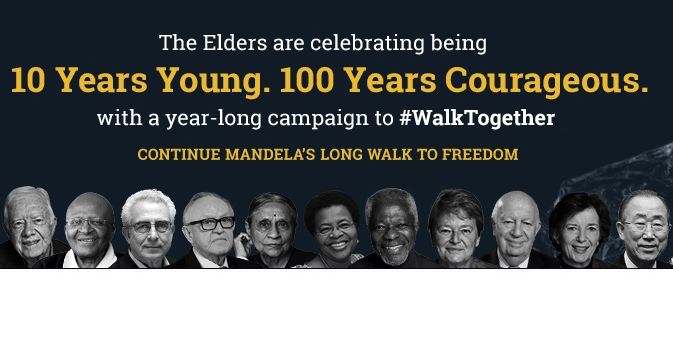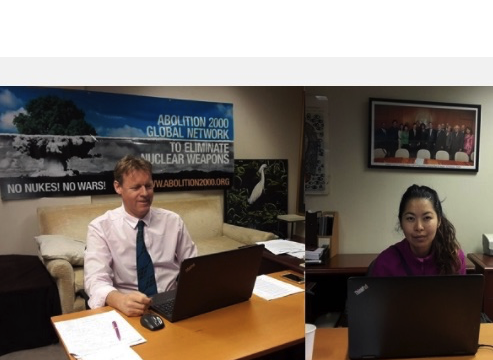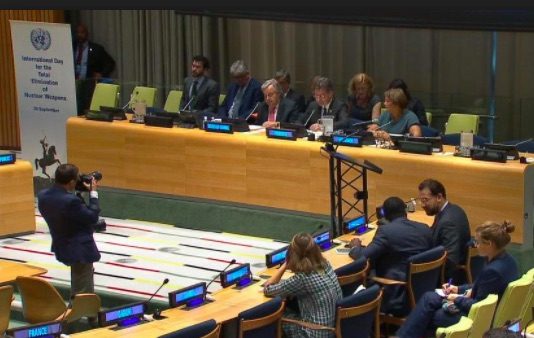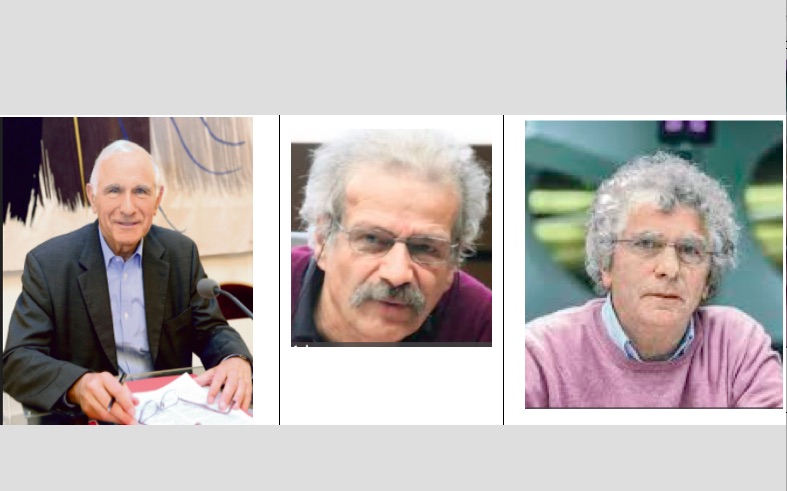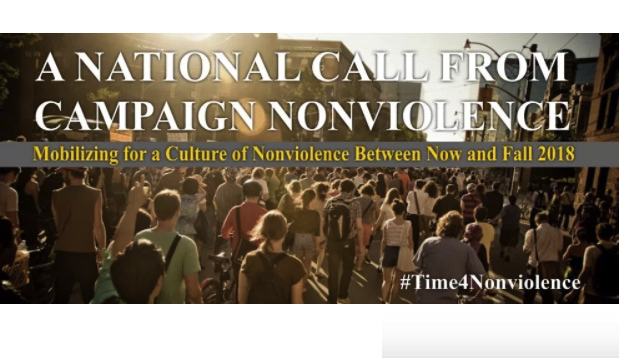DISARMAMENT & SECURITY .
An article from the International Campaign to Abolish Nuclear Weapons
During the general debate of the 72nd session of the UN General Assembly from 19 to 25 September in New York, presidents, prime ministers and foreign ministers from all regions of the world spoke in favour of the Treaty on the Prohibition of Nuclear Weapons, which opened for signature on 20 September. Here are some of the highlights.
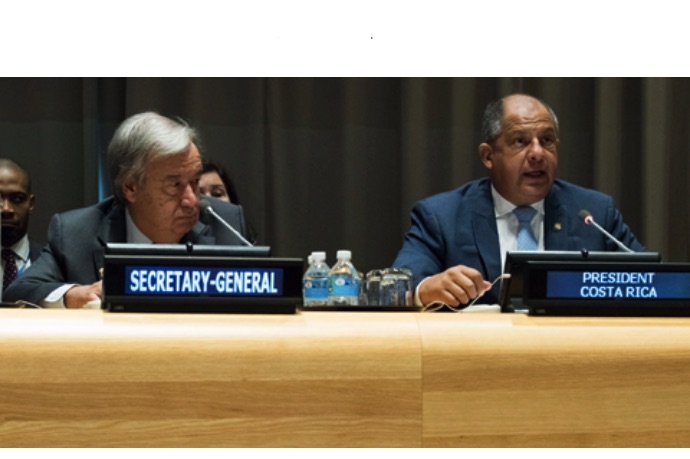
Austria: H.E. Mr. Sebastian Kurz, Federal Minister for Foreign Affairs
“The new Treaty on the Prohibition of Nuclear Weapons is an important achievement … It is a crucial step to get rid of all nuclear weapons. Today, we often hear that nuclear weapons are necessary for security. This narrative is not only wrong, it is dangerous. The new treaty provides a real alternative: a world without nuclear weapons, where everyone is safer. The overwhelming support of the international community in adopting this treaty demonstrates that many countries share this goal.”
Botswana: H.E. Mr. Mokgweetsi Eric Masisi, Vice-President
“Botswana fully supports the international community’s efforts towards nuclear disarmament. We also reaffirm our commitment to international instruments that ban weapons of mass destruction … In this respect, we welcome the recent adoption by the UN General Assembly of a legally binding treaty to prohibit the production of nuclear weapons. We are fully convinced that only a nuclear-free world would guarantee a safer future for our populations.”
Brazil: H.E. Mr. Michel Temer, President
“Tomorrow [20 September] I will have the honour of signing the Treaty on the Prohibition of Nuclear Weapons. Brazil was among the drafters of the treaty. It will be a historic moment.”
Burkina Faso: H.E. Mr. Roch Marc Christian Kaboré, President
“I urge all countries, particularly those whose ratification is necessary to this end, to make the rapid entry into force of the Comprehensive Test Ban Treaty a priority. In this context, the adoption on 7 July 2017 of the Treaty on the Prohibition of Nuclear Weapons should reinforce this dynamic.”
Cabo Verde: H.E. Mr. Jose Ulisses Correia e Silva, Prime Minister
“Cabo Verde has recently … signed the Treaty on the Prohibition of Nuclear Weapons, which was concluded in New York on July 7, 2017.”
Chile: H.E. Mrs. Michelle Bachelet Jeria, President
“We actively participated in the negotiations to generate the nuclear weapons prohibition treaty, which we signed this morning [20 September]. It is a historical fact that creates a rule establishing the basis for future negotiations that will allow the total elimination of nuclear weapons in a verifiable and irreversible way.”
Comoros: H.E. Mr. Azali Assoumani, President
“The Union of the Comoros, which took part yesterday [20 September] at UN headquarters in the signing ceremony for the new nuclear weapons treaty, which I myself signed, is joining the international community to require all countries concerned to comply fully with the relevant United Nations Security Council resolutions and to abandon their nuclear weapons programmes.”
Costa Rica: H.E. Mr. Luis Guillermo Solís Rivera, President
“We see with hope, joy and pride that the Treaty on the Prohibition of Nuclear Weapons was finally approved in July of this year, a process in which I congratulate the Costa Rican ambassador Elayne Whyte, who, as president of the conference during the negotiations, led the process with courage and great skill. That effort, together with that of the participating delegations, made a dream come true after more than seven decades. This treaty is a strong message that most UN member states do not support, do not accept, and do not consider nuclear weapons as legitimate, and that the international community clearly states that nuclear weapons are not only immoral, but are henceforth illegal. The adoption of this new norm of international law that absolutely prohibits nuclear weapons is therefore established in all circumstances and provides a solid and legally binding framework for the destruction and total elimination of nuclear weapons in a transparent, irreversible and verifiable manner within specified time frames. As an unarmed democracy resting its defence on international law, we are satisfied that in addition to prohibiting the development, production, manufacture, transfer, possession, storage, location, installation and deployment of nuclear weapons, the treaty explicitly prohibits the threat of its use, thereby also banning so-called doctrines of nuclear deterrence security. Many will say that all this effort is meaningless, since none of the nuclear powers had wanted to be part of it. I tell them they are wrong. The desire of the 122 countries that approved the text of the treaty is the legitimate voice of people who are lovers of peace and of the defence of humanity. Any effort to be on the side of disarmament will never be nonsense. Being on the side of peace will never be a mistake. Costa Rica applauds these 122 countries and all those who will sign the treaty tomorrow [20 September] and makes a vehement call for others to join in, so that we can ensure a future for us and for those who will come after us. It is our responsibility to continue to support the creation of peace so that we can build the world we dream about.”
Cuba: H.E. Mr. Bruno Rodríguez Parrilla, Minister for Foreign Affairs
“We all share the common responsibility to preserve the existence of human beings in the face of a nuclear threat. An important contribution to the achievement of that goal was the historic adoption of the Treaty on the Prohibition of Nuclear Weapons under the auspices of the United Nations, which proscribes the use and the threat of use of those weapons that have the capacity to annihilate the human species.”
Ecuador: H.E. Mr. Lenin Moreno Garcés, Constitutional President
“Today [20 September] we will subscribe to the nuclear weapons prohibition treaty, and we call on all countries to subscribe to this historic international instrument.”
Egypt: “Several recent remarkable developments, such as the adoption of the humanitarian pledge as well as a landmark treaty prohibiting nuclear weapons, are clear signs that the circumstances have changed on the international stage. These are clear messages that those non-nuclear-weapon states who have truly committed themselves to the principle of disarmament and non-proliferation are becoming increasingly impatient regarding the necessity of seriously addressing the gaps in the prevailing regime and the discrimination embedded therein, which was not intended to last forever at the time the NPT was negotiated and entered into force.”
Grenada: H.E. Mr. Elvin Nimrod, Minister for Foreign Affairs
“Grenada views the situation on the Korean peninsula with great trepidation, and our position on these matters is clear, and to that effect the cabinet of ministers has recently approved the signing of the Treaty on the Prohibition of Nuclear Weapons. The proliferation of nuclear weapons is inherently destructive and serves no useful purpose for humanity. The mere existence of these weapons is unacceptable. Let us never forget the suffering of the victims of Hiroshima and Nagasaki.”
Guatemala: H.E. Mr. Jimmy Morales, President
“Collective security can only be achieved through the prohibition and total elimination of nuclear weapons. For this reason, Guatemala tomorrow [20 September] will sign the Treaty on the Prohibition of Nuclear Weapons, which constitutes an important step towards a world free of nuclear weapons.”
Holy See: H.E. Archbishop Paul Richard Gallagher, Secretary of Relations with States
“The Holy See has signed the Treaty on the Prohibition of Nuclear Weapons and has already deposited its ratification, because it believes that it is an important contribution in the overall effort toward complete nuclear non-proliferation and disarmament, an advance toward the fulfilment of the commitment of the states parties to the NPT ‘to pursue negotiations in good faith on effective measures relating to cessation of the nuclear arms race at an early date and to nuclear disarmament’, and a step toward negotiating a ‘general and complete disarmament under strict and effective international control’. While much remains to be done for the Treaty on the Prohibition of Nuclear Weapons truly to make a difference and achieve its full promise, the Holy See believes that it is one more blow on the anvil toward the fulfilment of the prophecy of Isaiah: ‘They shall beat their swords into ploughshares and their spears into pruning hooks; One nation shall not raise the sword against another, nor shall they train for war again.’”
Iran: H.E. Mr. Mohammad Javad Zarif, Minister for Foreign Affairs
“Iran voted in favour of the Treaty on the Prohibition of Nuclear Weapons and will continue to support its overall objective. Contrary to some arguments that this treaty will undermine the Treaty on the Non-Proliferation of Nuclear Weapons, Iran is of the view that it will reinforce the nuclear disarmament regime.”
Ireland: H.E. Mr. Simon Coveney, Minister for Foreign Affairs and Foreign Trade
“Earlier this week I was very pleased to sign the recently approved Treaty on the Prohibition of Nuclear Weapons, which was supported by 122 members of this Assembly. Ireland is proud to have played a leadership role, together with Austria, Brazil, Mexico, Nigeria and South Africa, in bringing forward the UN resolution convening the diplomatic conference that negotiated this ground-breaking treaty. The case for the complete elimination of nuclear weapons has never been stronger as the volatile situation in the Korean peninsula makes clear.”
Jamaica: H.E. Mrs. Kamina Johnson Smith, Minister for Foreign Affairs and Foreign Trade
“Jamaica is deeply concerned about the heightened menace to international peace and security arising particularly from the threat of nuclear weapons. We have had a longstanding commitment to the goal of achieving a nuclear-weapon-free world and are a state party to the Treaty of Tlatelolco, which declared the Caribbean and Latin America as the first nuclear-weapon-free zone in a densely populated area. At the universal level, therefore, we welcome the fact that we now have the first global treaty on the prohibition of nuclear weapons, as a critical step towards addressing some of these concerns. It is our hope that it will enter into force in short order and will be duly observed universally.”
Kazakhstan: H.E. Mr. Kairat Abdrakhmanov, Minister for Foreign Affairs
“President Nazarbayev outlined a number of important initiatives [in August] that I would like to share with you … [including] to call for joint efforts to ensure that the Treaty on the Prohibition of Nuclear Weapons enters into force by 2020 – this is the 50th anniversary of the Treaty on the Non-Proliferation of Nuclear Weapons entering into force.”
Kenya: H.E. Ms. Amina Chawahir Mohamed, Cabinet Secretary for Foreign Affairs and International Trade
“Kenya welcomes the historic adoption on 7 July 2017 of the Treaty on the Prohibition of Nuclear Weapons. Although nuclear-weapon states are absent, the overwhelming majority of member states support the treaty. This demonstrates our concerns with the danger the use of such weapons poses to humanity, as we were all reminded by the unfortunate nuclear detonation that took place on 3 September. The adoption of the treaty gives us renewed hope that it is possible, if we work together, to rid the world of nuclear weapons.”
Laos: H.E. Mr. Saleumxay Kommasith, Minister for Foreign Affairs
“The Lao People’s Democratic Republic earnestly hopes to see the world without nuclear and other weapons of mass destruction. In this context, we welcome the recent adoption of the Treaty on the Prohibition of Nuclear Weapons, which we also signed two days ago [21 September]. But we are well aware that we still have an uphill task ahead of us for this treaty to enter into force and be effectively implemented. Therefore, the international community has to redouble its efforts in this respect.”
Lesotho: H.E. Mr. Thomas Motsoahae Thabane, Prime Minister
“On the nuclear disarmament landscape, the UN made significant progress a few months ago with the adoption of the Treaty on the Prohibition of Nuclear Weapons as the first legally binding international agreement to comprehensively prohibit nuclear weapons, with the goal of leading towards their total elimination. This is a historic achievement of our time, especially in light of the ongoing tensions in the Korean peninsula. The argument that nuclear weapons are a deterrent is a fallacy; these weapons are a threat to human existence and their possessors should do the right thing and renounce them in line with their international obligations. This treaty should not remain on paper only, but it must be ratified and implemented by all.”
Libya: H.E. Mr. Elmahdi Elmajerbi, Permanent Representative to the UN
“We believe that the international community has moved in the right direction by agreeing on a legally binding treaty for the prohibition of nuclear weapons … We welcome this treaty and we urge all states to sign and ratify it in order for it to enter into force. In this respect, we are among the 50 countries who have signed this treaty.”
Liechtenstein: H.E. Ms. Aurelia Frick, Minister for Foreign Affairs
“The people we serve look at us to reduce risks, to defuse tensions. Yet the world spirals towards a new arms race. We are facing increased risks of self-destruction. This includes the unspeakable horror of the use of nuclear weapons. Most of us remember the shocking pictures from Hiroshima and Nagasaki in August 1945 from our history books. The United Nations was built on the ashes of Hiroshima and Nagasaki, and on the promise of ‘never again’. But we have not delivered on this promise – in collective complacency. This week we have changed course for the better, with the signing of the treaty to prohibit nuclear weapons. No doubt, it will take time to see the effects of the treaty on nuclear stockpiles. But setting a number of important legal benchmarks that will become binding norms is great progress. Nuclear weapons are prohibited and should be eliminated. Their use can never be justified. The suffering they cause runs counter to the principles of humanity, basic tenets of international humanitarian law and the dictates of public conscience. On Wednesday [20 September], I signed the treaty on behalf of Liechtenstein, as one of 50 states. Together we extend a hand to those who so far have chosen to stay apart. We need their commitment to finally rid the world of nuclear weapons.”
(Continued in right column)
Question related to this article:
Can we abolish all nuclear weapons?
(Continued from left column)
Malaysia: H.E. Mr. Dato’ Sri Anifah Aman, Minister for Foreign Affairs
“Earlier this week [20 September], Malaysia joined other member states in signing the treaty to prohibit nuclear weapons. We are convinced that the political and legal impact of this treaty will steer the international community collectively towards the elimination of nuclear weapons and the maintenance of a world free of nuclear weapons. We were guided by the commitment of states on an instrument which is legally sound, feasible to implement and one that sends a powerful political message that nuclear weapons are categorically unacceptable.”
Maldives: H.E. Dr. Mohamed Asim, Minister of Foreign Affairs
“The Maldives applauds the monumental adoption on 7 July 2017 of the Treaty on the Prohibition of Nuclear Weapons following the United Nations conference to negotiate a legally binding instrument to prohibit nuclear weapons, leading to their total elimination. The treaty is the most important pledge that the international community has made in the relentless pursuit of a nuclear-free world.”
Marshall Islands: H.E. Mr. John Silk, Minister for Foreign Affairs
“Recent events should create far greater political resolve to curb and ultimately eliminate global nuclear threats. But if it were a task so easily done, perhaps the world would not have struggled for so long. In this regard, the Republic of the Marshall Islands supports those nations who are now able to affirm the Treaty on the Prohibition of Nuclear Weapons, and we will continue to add our own voice in all fora, including the CTBT and NPT. We are committed to a close and inclusive examination of our own participation in the nuclear ban treaty, listening closely to our stakeholders and affected communities, and also taking into account any possible implications on our mutual security relationships. It will always remain our fervent hope that such weapons of mass destruction shall never again be tested or unleashed, and that all nuclear-armed nations will have the necessary political will to disarm.”
Mauritius: H.E. Mr. Pravind Kumar Jugnauth, Prime Minister
“Mauritius voted in favour of the resolution adopting the treaty on the prohibition of nuclear weapons last July and we hope to see complete denuclearization throughout the world. We urge all those involved in potential conflicts around the world, especially where there is a possibility of nuclear weapons being used, to exercise restraint and promote dialogue instead of belligerent posturing that feeds unrest and dangerous escalation.”
Mexico: H.E. Mr. Luis Videgaray Caso, Minister for Foreign Affairs
“The existence of nuclear weapons poses a threat to the whole of humanity. Faced with the persistent nuclear danger, yesterday [20 September] the government of Mexico signed the Treaty on the Prohibition of Nuclear Weapons, which the executive will shortly submit to Senate for the approval of the republic.”
Mongolia: H.E. Mr. Tsend Munkh-Orgil, Minister for Foreign Affairs
“Current tensions have only deepened the concern associated with nuclear weapons. Mongolia welcomes the adoption of the Treaty on the Prohibition of Nuclear Weapons on 7 July 2017. So long as nuclear weapons exist, the risk of their use will persist. The only guarantee of the non-use of nuclear weapons is their total elimination.”
Morocco: H.E. Mr. Omar Hilale, Permanent Representative to the UN
“The adoption of the Treaty on the Prohibition of Nuclear Weapons is a landmark step towards the total elimination of these weapons and towards a more reassuring future.”
Nepal: H.E. Mr. Sher Bahadur Deuba, Prime Minister
“The vicious race for weapons of mass destruction continues to threaten the world. Nepal calls for a time-bound, general and complete disarmament. Nepal welcomes the confidence-building measures on conventional weapons, ending nearly two decades of stalemate in the UN Disarmament Commission. Nepal has signed the Treaty on the Prohibition of Nuclear Weapons as a step towards nuclear disarmament.”
New Zealand: H.E. Mr. Craig Hawke, Permanent Representative to the UN
“The risks associated with nuclear weapons and nuclear proliferation have been a key factor in New Zealand’s longstanding commitment to international nuclear disarmament. Last week [20 September] we were pleased to sign the Treaty on the Prohibition of Nuclear Weapons. The treaty represents an important step towards a nuclear-free world.”
Nicaragua: H.E. Mrs. María Rubiales de Chamorro, Deputy Minister for Foreign Affairs
“Nicaragua advocates for a general and complete disarmament and is in favour of the total elimination of nuclear weapons. We have signed the nuclear weapons prohibition treaty.”
Nigeria: H.E. Mr. Muhammadu Buhari, President
“The crisis in the Korean peninsula underscores the urgency for all member states, guided by the spirit of enthroning a safer and more peaceful world, to ratify without delay the treaty prohibiting nuclear weapons, which will be open for signature here tomorrow [20 September].”
Palau: H.E. Mr. Tommy Esang Remengesau Jr., President
“Taking into account the recent actions by North Korea, we must take seriously the long-term need to ban nuclear weapons. A good place to start is the accession to the Treaty on the Prohibition of Nuclear Weapons. I must give credit to the leaders of my country, who, over 30 years ago, recognized the threat of nuclear weapons and banned the use, testing and storage of nuclear weapons in Palau’s constitution. In their honour, yesterday [20 September] I signed this treaty.”
Paraguay: H.E. Mr. Horacio Manuel Cartes Jara, President
“In Paraguay, a constitutional provision bans weapons of mass destruction. Consequently, our country commends the recent adoption of the Treaty on the Prohibition of Nuclear Weapons.”
Peru: H.E. Mr. Gustavo Meza-Cuadra, Permanent Representative to the UN
“The proliferation of weapons of mass destruction and the possible access to them by terrorist groups are real threats. That is why we have signed the Treaty on the Prohibition of Nuclear Weapons and we hope that all states possessing such weapons will join this instrument.”
Philippines: H.E. Mr. Alan Peter S. Cayetano, Secretary for Foreign Affairs
“If we listen to each other, we will hear the same thing. We have no need for nuclear weapons. There is absolutely no benefit in another cold war, neither in an arms race. We want nuclear weapons to be a thing of the past and we do not want an arms race anywhere in the world. On July 7, the Philippines joined 121 other member states in securing our world from weapons of mass destruction by adopting the Treaty on the Prohibition of Nuclear Weapons. Three days ago [20 September], I signed the treaty. The Philippines calls on member states with nuclear weapons to likewise sign on. We can only have a safe world if we get rid of all nuclear and other weapons of mass destruction. By doing so, we ‘save succeeding generations from the scourge of war, which twice in our lifetime has brought untold sorrow to mankind’.”
Samoa: H.E. Mr. Tuilaepa Sailele Malielegaoi, Prime Minister
“As small island Pacific countries, we are no longer protected by our isolation – we are bystanders but with the greatest to lose in the unfolding power drama being played out in the Korean peninsula. We pray for visionary leadership with sound moral judgement on both sides to ensure we give peace a chance. It explains why I signed yesterday [20 September] on Samoa’s behalf the Treaty on the Prohibition of Nuclear Weapons. As a signatory to this historic treaty, we wanted to demonstrate unequivocally our aspiration to have a world without nuclear weapons. The conventional narrative that the possession of nuclear weapons will act as deterrent to make the world a safer place to live is not borne out by the current realities – otherwise the developments in the Korean peninsula would not have happened at all. We firmly believe that possessing nuclear weapons and adding new nuclear powers only make our world less safe, less secure and less peaceful – hence the need to rid our world completely of all nuclear weapons.”
San Marino: H.E. Mr. Nicola Renzi, Minister for Foreign Affairs
“The Republic of San Marino took part in the negotiations that led to the adoption of the Treaty on the Prohibition of Nuclear Weapons last July. The treaty is an important step to achieve the common goal of a world without nuclear weapons.”
South Africa: H.E. Mr. Jacob Zuma, President
“As a country that voluntarily dismantled its nuclear weapons programme, South Africa is of the firm view that there are no safe hands for weapons of mass destruction. The only viable solution to the problems of nuclear weapons is their total elimination as expressed in the recently UN-adopted treaty banning nuclear weapons. It can no longer be acceptable that some few countries keep arsenals and stockpiles of nuclear weapons as part of their strategic defence and security doctrine, while expecting others to remain at their mercy. We are concerned that any possible accidental detonation would lead to a disaster of epic proportions. We are making a clarion call to all member states of the UN to sign and ratify the ban treaty in order to rid the world and humanity of these lethal weapons of mass destruction.”
Tanzania: H.E. Mr. Augustine Phillip Mahiga, Minister for Foreign Affairs and International Cooperation
“Tanzania commends the recent adoption of the nuclear ban treaty, which puts nuclear weapons on the same legal ground as other weapons of mass destruction. We should all support this treaty in order to increase our moral authority in the fight against nuclear weapons proliferation.”
Thailand: H.E. Mr. Don Pramudwinai, Minister for Foreign Affairs
“Two days ago [20 September], Thailand signed and deposited our instrument of ratification to the nuclear weapons ban treaty. We are proud to be among the first countries to do so. We wish to call on others to do the same. By doing so, we are sending out our message to our children and grandchildren that we do care.”
Trinidad and Tobago: H.E. Mr. Dennis Moses, Minister for Foreign Affairs
“Trinidad and Tobago was among the 122 states which voted in favour of the Treaty on the Prohibition of Nuclear Weapons, which was adopted on 7 July 2017. This treaty is particularly significant as it is the first multilateral legally binding instrument for nuclear disarmament to have been negotiated in 20 years. We look forward to the convening of the high-level conference on nuclear disarmament by 2018. As a small island developing state, Trinidad and Tobago actively participated in the negotiations to prohibit nuclear weapons, acutely aware of the destructive force of these weapons of mass destruction to, inter alia, human life, the environment, food security, infrastructure and economic growth.”
Tuvalu: H.E. Mr. Enele Sosene Sopoaga, Prime Minister
“Just yesterday [20 September], with pride on behalf of Tuvalu, I signed the Treaty on the Prohibition of Nuclear Weapons as a further commitment to the South Pacific Nuclear Free Zone Treaty, which was negotiated and drafted in the 1984 Pacific Island Leaders Forum held in Tuvalu. It is our fervent hope that nuclear weapons and other weapons of mass destruction, including the trade of materials and development of technologies to produce such weapons, are totally banned and prohibited worldwide by the UN. Humanity must be advanced not on the principles of fear and deterrence, not on the adage of might is right, rather on moral justice for human equity, trust, respect, and the full enjoyment of basic human rights.”
Uruguay: H.E. Mr. Rodolfo Nin Novoa, Minister for Foreign Affairs
“Uruguay welcomes the success of the United Nations conference that negotiated a binding instrument to ban nuclear weapons and bring about their total elimination, which concluded with the adoption of the historic Treaty on the Prohibition of Nuclear Weapons, recently opened for signature by all states, and which Uruguay has just signed [20 September]. In this sense, we call on all countries to sign this instrument, which aims to ensure a decent life for future generations and avoid a humanitarian catastrophe.”
Vanuatu: H.E. Mr. Charlot Salwai Tabimasmas, Prime Minister
“My government reaffirms its commitment to the denuclearization of the Pacific, and we salute the treaty adopted by the conference to negotiate a legally binding instrument to prohibit nuclear weapons. Vanuatu reaffirms its commitment to total nuclear disarmament.”
Venezuela: H.E. Mr. Jorge Arreaza Montserrat, Minister for Foreign Affairs
“Venezuela is strongly opposed to the existence of nuclear weapons on our planet. Their possession presents to humanity unjustifiable and unimaginable anguish and risks. That is why we signed last Wednesday [20 September] the nuclear weapons prohibition treaty. We must make a supreme effort, so that the nuclear crises de-escalate and disappear (hopefully with their weapons) through dialogue and human rationality.”
Vietnam: H.E. Mr. Phạm Bình Minh, Deputy Prime Minister
“We welcome the recent adoption of the Treaty on the Prohibition of Nuclear Weapons, a historic milestone towards a world free of nuclear weapons. Today [22 September], I sign this treaty and call upon others to sign and ratify the treaty to enable its early entry into force. Let us all be clear: the danger of nuclear weapons still looms over mankind as long as they exist.”
Zambia: H.E. Mr. Edgar Chagwa Lungu, President
“Zambia is gratified by the signing of the nuclear weapons ban treaty recently [adopted] in July 2017. We congratulate all those who worked so hard to achieve this result, and we look forward to witnessing its coming into effect.”
